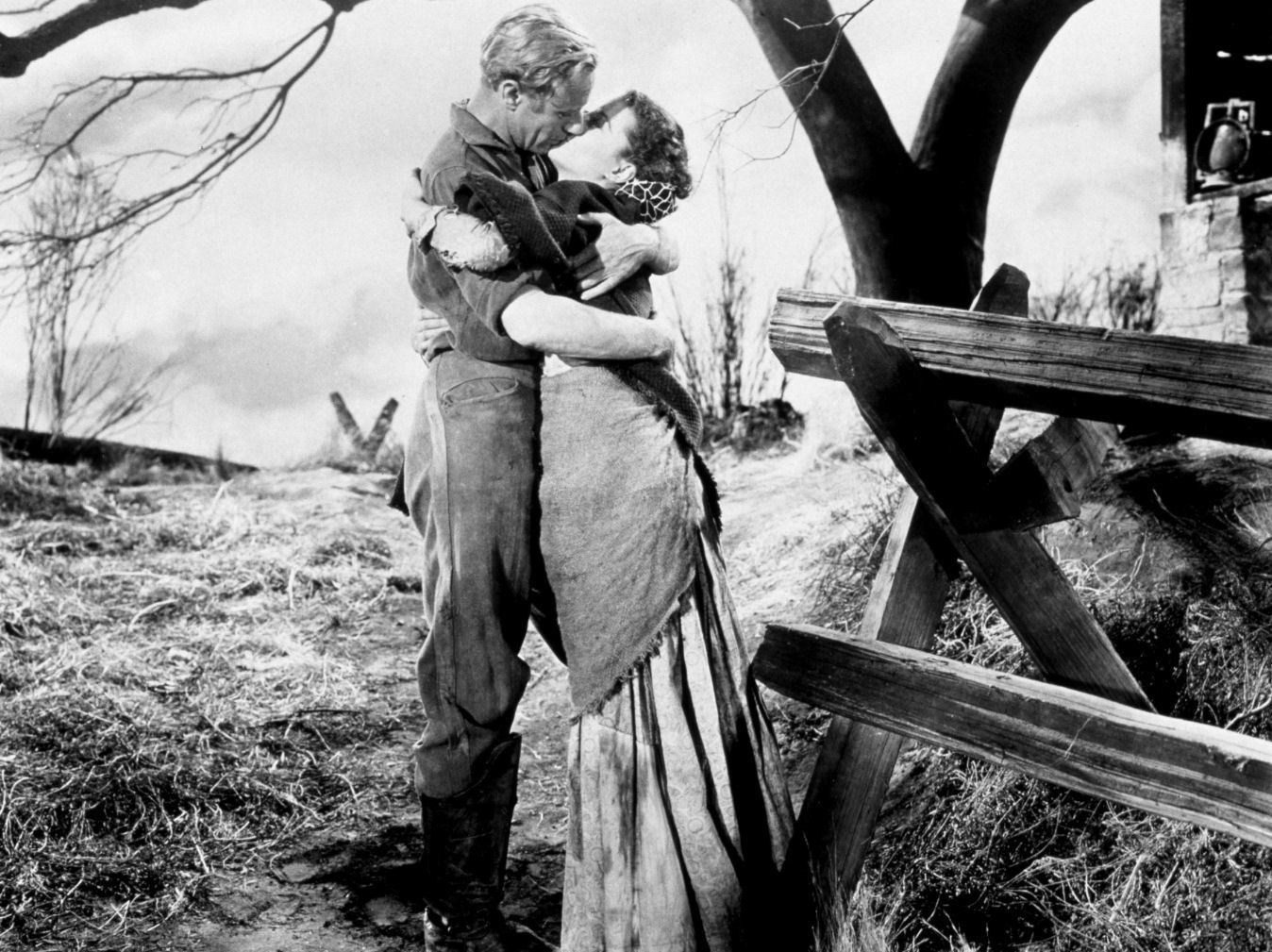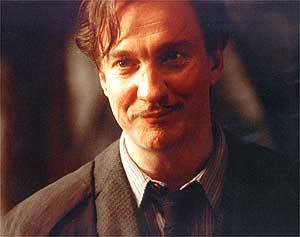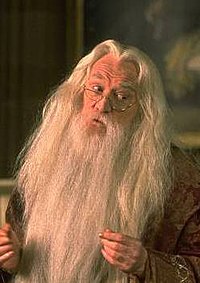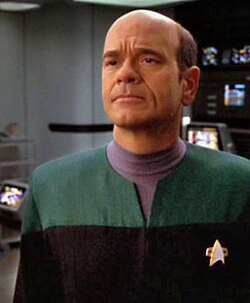 A bit ago I threatened a post about Gone With the Wind. I might as well make good on it. I won't insult your intelligence by claiming this is British in any way (though, if I were to try, I might build on Vivien Leigh's heritage). . . . We both know this post is here only because I'm suffering from a serious case of "the holidays" and don't have many new insights to give on appropriate things.
A bit ago I threatened a post about Gone With the Wind. I might as well make good on it. I won't insult your intelligence by claiming this is British in any way (though, if I were to try, I might build on Vivien Leigh's heritage). . . . We both know this post is here only because I'm suffering from a serious case of "the holidays" and don't have many new insights to give on appropriate things.But I find that I have a lot to say about Scarlett.
I watched this classic the other night because I'd had a fight with my sister. Aw, not a bad one – but a disagreement, a clash of the minds . . . about Scarlett O’Hara. My lovely sis, who is brilliant and to whose opinion I generally defer under most circumstances, had seen GWTW on TV and it was on her mind. She wanted to vent about what a horrible bitch Scarlett was. Trouble is, I have always found Scarlett to be infinitely sympathetic and, if not always likeable, a basically appealing character.
But fresh in my sister's thoughts were scenes of Scarlett harshly working her convicts in the lumber mill, concerned about nothing but making money, scenes hammering home Scarlett's ambition and lack of caring, her ruthless cruelty. I remembered those . . . but I remembered more that Scarlett was a woman of courage and passion, of strong driving energy, and of great charm -- the quintessential worthy survivor. But maybe I was wrong! Maybe my impressions were unduly influenced by the prejudices of my youth. I mean, I first read the book and saw the film when I was in high school, as an impressionable girl with limited experiences. So I watched again. Just to check.
And what I found was this: my old impressions are right. I still feel the same way about Scarlett. I don't hate her. I understand and appreciate her and what she's had to grow through. From a pampered, headstrong, vivacious girl – lacking in depth but having never really required depth to progress happily through her life, to someone who could survive at any cost by overcoming tragedies and horrors piled high upon each other.
Scarlett, as the show starts, is nothing if not supremely well-adapted to the life that she’s grown up in. A practical girl, she isn't looking for complexity or difficulties. She's looking to be happy. Of course we can fault her for being shallow and misguided (but these faults are present in many characters, even lovable ones. Emma, anyone?) And we can also fault her for having blindly accepted the benefits of slavery without introspection. However, she cannot be singled out to carry this blame; other more sympathetic characters (Melanie?) are similarly flawed. And we might not prize her headstrong comfort-seeking, but we can accept that a great many 16-year-olds are like that, making her not all that different from some of us at 16 or even at 26.
Scarlett sees great value and takes pride in her ability to attract others, to persuade them and compel them. She has tremendous personal power and is just learning how to best wield it. Born in a more recent era, she might have been a politician or PR genius. But in her time, she uses her assets for the advantage of gaining a man. And it works extremely well for her. Scarlett is pursued by scores of young men. She, however, is only drawn to one: the most interesting of them all – a wealthy, sensitive, intellectual. Can we at least agree that her attraction to a man of depth and understanding shows good taste and judgment?
 But Ashley is also Scarlett's downfall. We might applaud her taste in desiring such a man, but her steadfast adherence to the fantasy of Ashley is her biggest character flaw. She cannot move past that blind until very late in the story. She is convinced that they belong together despite powerful and continuing evidence to the contrary. It is a sad flaw but an understandable and common one.
But Ashley is also Scarlett's downfall. We might applaud her taste in desiring such a man, but her steadfast adherence to the fantasy of Ashley is her biggest character flaw. She cannot move past that blind until very late in the story. She is convinced that they belong together despite powerful and continuing evidence to the contrary. It is a sad flaw but an understandable and common one.In part because she sees herself as the tragic victim, and in part because she is confined by her time in history to think of her life’s work in terms of marriage, when Scarlett learns that Ashley is to wed another – a woman she can’t like or respect, a quiet, meek, gentle, introspective thing – she flings herself headlong into anything else and marries a ridiculous man. You know she's thinking: "it can’t possibly matter what I do now!" This cutting off her nose to spite her face in a fit of headstrong stubbornness is, again, a flaw I find sad, but understandable -- seeing it often in my children's stubborn choices. Yes, Scarlett is childish, but I appreciate her pain and like her more for it.
The marriage to Charles and his quick death as the war sets in, mark a turning point. She has lost her youth. She will soon lose her home and her mother. It is the loss of these things in quick succession without understanding and without closure that results in her keeping Ashley so high in her thoughts as an ideal. She sees in him everything that is dignified and fine, everything that is safe and comfortable, and everything that reminds her of her past glory. The genteel life with Ashley on a dignified plantation that lives in her head sits in stark contrast to the one she’s somehow found herself in the middle of in Atlanta as war rages around her. She finds herself unwillingly nursing sick and mutilated men -- going entirely against her own nature to do it, staying in a place of danger in order to help Melanie with her baby’s birth, though doing so prevents her from being with her own people and her own home when that is all she wants.
One of the most powerful scenes in the movie, demonstrating how Scarlett has found and acts from a source of deep inner strength, is when she learns that the doctor is not coming and that Prissy “knows nothing about birthing babies.” Squaring her shoulders, she ascends the steps to tend to Melanie, to help this weak woman she thinks she hates, deliver the baby of the man she loves. Scarlett shows that she can and will step up and do what she has to. No matter what. From this point on, that will be her guiding principal: doing whatever has to be done in order to get through. The baby is born and by sheer force of will, she plows through the countryside with her little pack of helpless beings in tow and makes her way home.
 Getting there just one day too late to see her beloved mother alive, but fully able to appreciate that her father is no longer of sound mind, the young disillusioned belle wants to throw herself on a bed and weep. But she can’t. Instead, she takes charge of everything around her. A force of nature, she propels everyone into action, cleaning up the house and farm and making it run. She has no patience for anyone or anything that gets in the way or causes more work. A second mantra, along the lines of "if you can’t help me just get the heck out of my way” develops for Scarlett. Scenes such as her interaction with the deserter show how far she's come and what she is willing to do to preserve her tumble-down plantation and rag-tag family. And we (like Melanie) are glad she shoots him. Every day she makes choices that seem perfectly reasonable in the context of what life has now become.
Getting there just one day too late to see her beloved mother alive, but fully able to appreciate that her father is no longer of sound mind, the young disillusioned belle wants to throw herself on a bed and weep. But she can’t. Instead, she takes charge of everything around her. A force of nature, she propels everyone into action, cleaning up the house and farm and making it run. She has no patience for anyone or anything that gets in the way or causes more work. A second mantra, along the lines of "if you can’t help me just get the heck out of my way” develops for Scarlett. Scenes such as her interaction with the deserter show how far she's come and what she is willing to do to preserve her tumble-down plantation and rag-tag family. And we (like Melanie) are glad she shoots him. Every day she makes choices that seem perfectly reasonable in the context of what life has now become.But she still thinks she wants to give it all up. When the taxes on Tara are raised to $300 she wants to take her cares to her father, or even to the servant, and ultimately to Ashley. She is desperate for someone, anyone, to take a share of the load. Her scene with Ashley in the paddock expresses the misery and fatigue of living the life she doesn’t want to live along with her deep desire for what she thinks she is in love with. She wants escape. But she doesn’t get it. Not only will he not run away with her, but Ashley is useless on the farm and only prolongs her unreasonable infatuation by saying he loves her and kissing her passionately.
More weight gets quickly piled on her. For just after this scene, she throws the overseer off her land and her father, inspired by her strong words, rides off on his horse, makes a foolish jump and dies. Now she has another dead parent and still no $300. She decides to parlay her very best value (her great personal charm) into an offer from someone who can pay that bill. She starts with Rhett Butler (who I'll talk about in a minute). She tries to charm him and then outright proposition him. She’s willing to humiliate herself but even he can’t help her. So when she sees Frank Kennedy and learns that he has money, she plows in headlong. Of course stealing her sister's beau is a pretty bad thing. I'll grant that. But I'll defend her motives. She is not personally interested in getting rich here (not yet); she's interested in saving her farm and her family, keeping her home together, her parents' memory intact, and to maintain what they have left.
At this crucial juncture in the story, it is interesting to note that both the man she loves and the man who loves her have utterly failed to help her and she's on her own. And this, finally, is a theme that comes newly to me upon this recent viewing. Scarlett becomes who she is in large measure because of the way others have let her down (her mom, by dying; her dad, by losing his mind, then dying; but particularly the love interests in her life). Ashley admits as much himself after Scarlett comes home married to Frank: “its all my fault; I should have committed highway robbery rather than let you sell yourself in marriage to a man you don’t love.” Exactly! But he didn't. He talked to her about honor and love and encouraged her fantasies but made no move to put money in her hands. Rhett is worse -- when she asks for his help he toys with her and laughs at her, baits her, but won't even provide a shoulder of sympathy or a strategy to get that cash. I'll talk more about him in a minute. (I know I said that before, but I'll get to him).
Before I do, first, some thoughts on Scarlett's toughness and power. At the point where she marries Frank, she turns another corner. Her motivations start to blur. She now has enough money to save Tara, but now that is no longer enough. She learns that she is shrewd at business and she wants to amass wealth -- enough so that no one can ever threaten her again. This is the point when she starts to lose her soul. She is so attached to an idea of poverty that she can’t see. She says: “I found out that money is the most important thing in the world”. I don’t like who she becomes, but I understand how she got there -- what motivates her. She sees paths with beacon lights shining down that lead to more and better ways of making money. It is easy for her and sooooo seductive. But she doesn't have a mommy who can help her see bigger, more important values. Though shrewd and smart in business, she is thick and slow in life. She doesn’t see larger implications of her own actions. The night of the Shantytown raid is the perfect example. She is like a child seeing only the surface and misunderstanding everything. It’s a scary mix of qualities – headstrong capitalist, deeply infatuated with a man who is symbolic of everything she’s lost, in deep grief for the loss of her way of life and her parents but far too superficial to even realize she’s in grief, on top of everything insanely charming and persuasive. No one can possibly stand up to her - except for one man. But he fails her entirely.
So now we finally get to Rhett: the one person who is strong enough to balance her. The one who could have made a difference had he been really willing to take her on. But he fails her! I thought that upon a new viewing of the movie I might, as a grown-up, form new harsher impressions of Scarlett than those I'd formed as a child in love with her charm and vivacity. But something surprising happened. Instead, I found a new disappointment in Rhett.
Rhett lets her down so very many times, usually justifying it by convincing himself she can handle things herself. But how can a young woman with no resources and nothing but spunk and charm and an enormous amount of naivety possibly be able to negotiate the demands of the post Civil War south without making great errors? Rhett begins this illustrious trail of failure when he dumps her on the road to Tara, leaving her to manage three helpless beings in a wagon with absolutely no notion of what they'd find at home. This really is inexcusable. Any person with his resources and experience should have finished seeing her home before heading off to war. When she goes to him in jail and connives for money, he not only doesn't give it to her, but much worse still, makes fun of her, toys with her, doesn't take her plight seriously, and then later, ridicules her for having married Frank.
 He may be in love with her, but he’s absolutely useless to her. After Frank dies and she’s pouring out her heart to him in the most honest and real display of vulnerability she has ever shown, he again, diminishes her. I never noticed this before -- being too caught up in the intense sexiness of the proposal scene. But he doesn’t even try to hear her, to understand her feelings, or engage with her in a meaningful way. He just finds her amusing. He chooses to make sport of her and keep her at arms reach. He can’t really love. But he asks her to marry him anyway.
He may be in love with her, but he’s absolutely useless to her. After Frank dies and she’s pouring out her heart to him in the most honest and real display of vulnerability she has ever shown, he again, diminishes her. I never noticed this before -- being too caught up in the intense sexiness of the proposal scene. But he doesn’t even try to hear her, to understand her feelings, or engage with her in a meaningful way. He just finds her amusing. He chooses to make sport of her and keep her at arms reach. He can’t really love. But he asks her to marry him anyway.During their marriage, things fall apart slowly. He is aware of her infatuation for Ashley and it makes him insanely jealous, but he makes very little effort to actually address it -- to think about or counter what Ashley must mean to her to inspire such feelings. He won't seek her respect or talk with her seriously. At several points in their marriage, such as when he comes back after going off on a trip with Bonnie and she greets him with a genuine smile, or when he comes into her room the morning after his passionate sweeping her up the steps and she is in a very sweet temper, he fails to pay any attention to her friendly signals. These are as big as neon signs and anyone paying a modicum of attention to his wife could read them. But he doesn't. We think of Scarlett as being cruel to Rhett -- and she is -- but he is just as cruel. And his cruelty is worse because he has so much more personal freedom and power.
The birth of Bonnie Blue is a whole other double edged sword that harms this ill-fated couple. Bonnie should be Scarlett’s savior – a chance to connect with real virtue, real meaning. But it does the opposite; it makes her thoughts turn to Ashley as she sees motherhood diminishing her value and attractiveness as a woman. In her simple, mixed-up, confounded mind she thinks of Ashley being celibate (because Melanie can’t have children) and takes up the idea to turn away from Rhett in order to live in a state of cherished ideas; if she can’t be with Ashley she can live a celibate life too thinking about him. Rhett tells her she’s “throwing away happiness with both hands” looking for something that can never make her happy. Which is exactly what she’s doing; but she is far too simple to see it. Bonnie's birth creates another great rift for this marriage. Bonnie usurps Scarlett as object of devotion and sweet love for Rhett (of the kind we saw on the cruise/honeymoon). Rhett no longer needs to make any effort to be kind and gentle to Scarlett, because Bonnie can be his object of devotion. Oddly, this child has torn apart anything that bound these two together.
And we all know the famous ending -- how Melanie finally dies and Scarlett realizes how much she loved and cared for her all along. And, more importantly, how Scarlett realizes that, even though now she might conceivably have him, Ashley is not at all what she wants. She runs to find Rhett who has suddenly and inexplicably given up all interest in her and tells her he doesn't give a damn. Cue the personal revelations of Scarlett as she mourns his loss for a moment or two before realizing she should go home to the red earth from whence she gets her strength.
Ultimately, the question of whether Scarlett does gets him back -- at some point to be determined later -- doesn't really matter. (Though I think she does. Get him back, I mean. If Scarlett O'Hara puts her determination toward solving some problem, it is pretty likely that that problem will be solved). But there is no doubt that Scarlett will be fine. She is already fine. She will go back to Tara and, with or without Rhett, lead a happy, full and probably seriously messed up life!
One final thought: I am so thankful for the astonishing Vivien Leigh who is both so stunningly beautiful and so profoundly talented in this role that she takes over my entire brain. This performance was a gift to the world for all time.




































